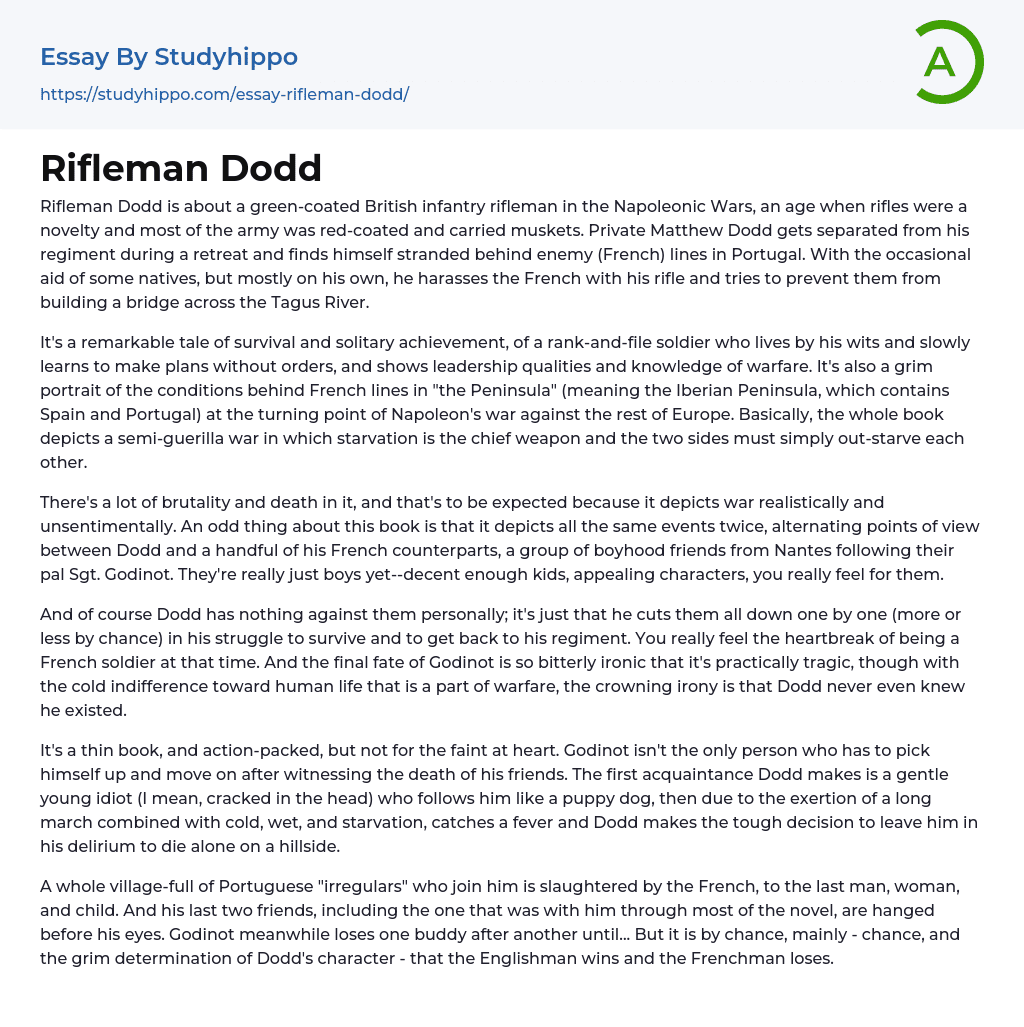
Rifleman Dodd is about a green-coated British infantry rifleman in the Napoleonic Wars, an age when rifles were a novelty and most of the army was red-coated and carried muskets. Private Matthew Dodd gets separated from his regiment during a retreat and finds himself stranded behind enemy (French) lines in Portugal. With the occasional aid of some natives, but mostly on his own, he harasses the French with his rifle and tries to prevent them from building a bridge across the Tagus River.
It's a remarkable tale of survival and solitary achievement, of a rank-and-file soldier who lives by his wits and slowly learns to make plans without orders, and shows leadership qualities and knowledge of warfare. It's also a grim portrait of the conditions behind French lines in "the Peninsula" (meaning the Iberian Peni
...nsula, which contains Spain and Portugal) at the turning point of Napoleon's war against the rest of Europe. Basically, the whole book depicts a semi-guerilla war in which starvation is the chief weapon and the two sides must simply out-starve each other.
There's a lot of brutality and death in it, and that's to be expected because it depicts war realistically and unsentimentally. An odd thing about this book is that it depicts all the same events twice, alternating points of view between Dodd and a handful of his French counterparts, a group of boyhood friends from Nantes following their pal Sgt. Godinot. They're really just boys yet--decent enough kids, appealing characters, you really feel for them.
And of course Dodd has nothing against them personally; it's just that he cuts them all down one by
one (more or less by chance) in his struggle to survive and to get back to his regiment. You really feel the heartbreak of being a French soldier at that time. And the final fate of Godinot is so bitterly ironic that it's practically tragic, though with the cold indifference toward human life that is a part of warfare, the crowning irony is that Dodd never even knew he existed.
It's a thin book, and action-packed, but not for the faint at heart. Godinot isn't the only person who has to pick himself up and move on after witnessing the death of his friends. The first acquaintance Dodd makes is a gentle young idiot (I mean, cracked in the head) who follows him like a puppy dog, then due to the exertion of a long march combined with cold, wet, and starvation, catches a fever and Dodd makes the tough decision to leave him in his delirium to die alone on a hillside.
A whole village-full of Portuguese "irregulars" who join him is slaughtered by the French, to the last man, woman, and child. And his last two friends, including the one that was with him through most of the novel, are hanged before his eyes. Godinot meanwhile loses one buddy after another until... But it is by chance, mainly - chance, and the grim determination of Dodd's character - that the Englishman wins and the Frenchman loses.
- Air Force essays
- Army essays
- Soldiers essays
- Army Values essays
- United States Army essays
- Veteran essays
- Aircraft essays
- Sergeant essays
- Culture essays
- Social Control essays
- Citizenship essays
- Social Justice essays
- Caste System essays
- Social Responsibility essays
- Socialization essays
- Deviance essays
- Modern Society essays
- Popularity essays
- Civil Society essays
- Community essays
- Female essays
- Filipino People essays
- Igbo People essays
- Indigenous Australians essays
- Indigenous Peoples essays
- Minority Group essays
- Social Institution essays
- Men essays
- The nation essays
- Middle Class essays
- Social Norms essays
- Discourse Community essays
- Popular Culture essays
- Car Culture essays
- American Culture essays
- Mormon essays
- Indian Culture essays
- Mexican Culture essays
- Pop Culture essays
- Cultural Differences essays
- Culture Shock essays
- Different Cultures essays
- World War I essays
- World War Ii essays
- Atomic Bomb essays
- American Civil War essays
- Attack essays
- Cold War essays
- Crimean War essays
- Emilio Aguinaldo essays



